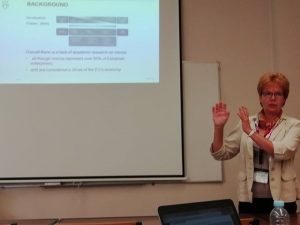
Servitization is a great business opportunity for micros, but it is important to know what competencies a firm needs when targeting the longer and more profitable customer relationships that servitization may offer. Micros possess limited human resources and thus competencies, and it is crucial for them to understand competence-related challenges in order to operate successfully.
The recent study of micro enterprises in the ProcessSME project indicated that micros face competence-related challenges in servitization in terms of entrepreneurship, functioning under change and financing. Entrepreneurial competencies are strongly linked to recognising opportunities and envisioning future business opportunities. There is also a need for change competencies, both for micros and customers, including the ability and willingness to change by renewing employees’ skills and methods of working. Financial difficulties and a lack of understanding regarding future economic responsibilities were highlighted as challenges as well.
Servitization means enhancing the capabilities and renewing the processes of a company in order to create mutual value for the company and its customers. Micros employ 1–9 people, and thus have limited human resources, and therefore limited competencies. The quality of personnel limits micros from entering the field of servitization. Employees’ individual attitudes and conditions influence new business outputs. The unwillingness to work outside the premises and ambitiousness both indicate the personal valuation of work circumstances and institutional and social appreciations, all of which a micro may find difficult to change.

Lowering the threshold by networking
The study found that limited human resources are caused by a lack of time. Acquiring knowledge and familiarising oneself with servitization takes time from entrepreneurs and employees, but small firms can lower the threshold by networking. Sharing resources and building trust with partners in a network broadens human resources and enables efficient, flexible, high-quality and time-based operations. Using network co-operation had not been considered by micros but can be done to broaden human and other resources in the future.
Additionally, the study indicated that financial competencies challenge micros through the increased consciousness of investments and costs, which may fall on a supplier instead of a subcontractor. Moreover, the study found that servitization changes the business environment. Overall, through change competencies, it is easy for a micro to enter the field of servitization.
The findings of the research were presented in the ECIE conference (13th European Conference on Innovation and Entrepreneurship) in Portugal in Aveiro in September 2018.
Kyllikki Taipale-Erävala
Post-Doctoral Researcher
University of Oulu
kyllikki.taipale-eravala@oulu.fi









